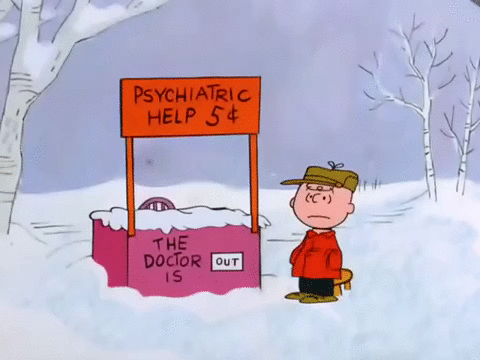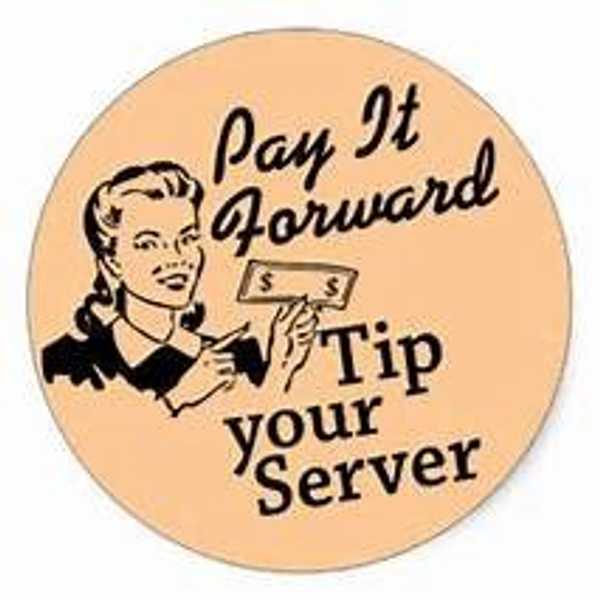Anyone who has been a customer at a restaurant knows that "the customer is always right." Complaining about the wait time, the table, the servers, the food, or the ambiance are all totally fair game, given the threat of a potentially nasty Yelp review, right? Well, anyone who has worked in the restaurant industry can tell you that the customer is pretty much never right. In fact, the customer usually doesn't know shit.
Growing up, I always fantasized about being a waitress. "How fun it would be to wear my hair in a high ponytail and write down orders on my fun little notepad, to press those giant, satisfying buttons on the register screens and to wear a fanny pack full of straws. Oh, and to receive giant tips just for bringing someone their food! Easy, breezy, beautiful." Admittedly, this was pretty much still my mentality walking into my first day as a hostess at a local burger joint, last year. However, I quickly learned that there are reasons why people always laughed at my childhood fantasy; for working in a restaurant is not easy, nor beautiful. Working in a restaurant simply means emotionally and physically draining hours without even the promise of the effort being being worth your while.
The American service industry is utterly and outrageously, fundamentally and uniquely irrational when it comes to wages. Instead of paying servers an hourly minimum wage, servers are paid around $2.50 per hour by their institution, while the responsibility of funding the rest of a server’s paycheck is placed on the customer through a necessitated tip (yet another example of the US nonsensically differentiating ourselves from the norms of the rest of the world). Consequently, a profound extra pressure is placed on a server to over-perform, typically to only receive the minimum payment they deserved regardless. The obvious problems here lie in the realities that:
1) Most customers do not understand that their decision to pay a proper tip is most directly a decision of whether a server should be paid properly; thus, we tip poorly.
2) Most of us are far more selfish than we like to think; given the choice, we will choose to save ourselves a few bucks. Thus, we tip poorly.
Though I was unaware of how servers are actually paid prior to getting a job in a restaurant, I always assumed that most every customer pays an adequate tip on their own accord; however, this is another tragic misconception. It is not the norm for a server to receive a proper tip. Nothing was more heartbreaking than the regularity of a server approaching me to show off their stack of receipts with tip lines left blank, often rolling their eyes or laughing sarcastically in remembrance of the elaborate performance they had just put on for a table that evidently wasn’t going to pay them regardless. Worse were the times when I would seat a server’s entire section with large parties of people with the logical, yet retrospectively naïve, conception that more people equals more money. Contrary to what you may think, more people does not equate to a greater tip; rather, more people simply means more thinly-spread responsibility—a responsibility that we have learned to be readily ignored in the first place. Again, all this means is that a server just spent their past two hours entertaining each one of your extended family members with, at the very least, a smile on their face only to receive a $5 bill that feels more like a slap in the face than a “thank you.”
When I first started my job as a hostess at a local burger joint, I was greeted with incredible nonchalance. People are hired and fired in that restaurant as regularly as customers come and go, so no one was going to make the effort to learn my name until they were sure they were going to have to know it for a while. Though each person working at the restaurant was wildly different, the restaurant had pretty distinct cliques and a tangible hierarchy associated with them. There were those who had been working there for years who resided at the top of the pyramid, crowning themselves above the sea of nomads: the college kids who would pop back in every so often, the high-schoolers who were harmlessly picked on, and then the miscellaneous, ever-changing group of people who, from the moment they were hired, had everyone placing bets on how long they’d last (either because they were just so strange or so overwhelmingly troubled).
I never knew how much effort I was to devote to cultivating these coworker relationships, as I knew they were only circumstantial and were a means to an end; however, those two reasons exactly were what I found myself to cherish in the friendships I ultimately developed. Coworkers provide such a nuanced relationship, as it is mutually understood to be fleeting. This understanding, of the relationship’s brevity and relative unimportance, allows both parties to ignore the initial pleasantries of relationships and ultimately, however unexpectedly, exist in a heightened state of vulnerability. At work, no one really cared who I was and everyone was eager to tell me if I made a mistake; however, because every interaction with my coworkers was frank, sometimes brutal, these relationships were uniquely true. The need for routine straightforwardness in this line of work meant the elimination of all of that well-intentioned, essentially meaningless, tip-toeing-over-your-feelings, “get to know you” superficiality that is expected in most any other type of relationship. Ironically, this straightforwardness also meant exposure to incredibly quaint and resonant moments.
As a hostess, my job was to be propped in the corner, leaned against a podium for hours on end, and await and tend to the eventual customer. However, throughout the moments in between, I found myself fulfilling another role—one where I awaited and tended to the needs of the restaurant staff themselves. No, I don’t even mean this in the sense of immediate, job-related needs, like bussing tables or retrieving menus (though I definitely did that, too), I mean tending to individual staff-members’ genuine, more personal needs. In the eyes of the restaurant goer, I was Lucy, the young girl at the podium who wouldn’t give them their table; however, in the eyes of the restaurant staff, I was Lucy, the familiar young girl slumped at her stand offering psychiatric help.

Everyone from busboys to servers to bartenders to managers would, one by one like clock-work, approach the other side of my stand, drape their elbows over the front, and unload whatever would allow them to feel lighter afterward. For Dan, the forthright, talkative, 40-something, chin-pierced restaurant industry veteran lugging a large ego to entertain his covertly sensitive demeanor, to ‘feel lighter’ meant very regular visits of high self-disclosure; lengthy, rambling, personal exposés to always conclude in the quick shrug of his shoulders. For Keith, the scrawny, total-body-tattooed, teeth-deprived, yet unassumingly sincere 30-something part-time bartender and retired teen-parent, to ‘feel lighter’ meant vague conversations of ‘hard times’ and quizzing me on classic rock, always concluding in his satisfied chuckle or kind smile-- a smile that was enigmatically endearing, all gaps considered. For anyone who would take them, my services meant a trip to a therapist that they would never be able to fit into their double-shift schedules, let alone afford, but trips that each one of them profoundly needed. These people had already lived lives with more tragedy, difficulty, and demonstrated resilience than I will likely ever have to understand or relate to. Yet, they desired no pity, further would resent it, and continue to be some of the most honest people I have ever met.
And then there were others, those of a different kind. Those who smirked as they eyed me up and down—slowly and with care, as though they were undressing me. Those who whispered in my ear or stroked my leg when passing by, who called me “mami,” who tried to scare me—playfully, nonetheless terrifyingly. Those who glared at me for no reason other than to make me feel small. All of them were struggling in complex and differing ways. Many of them had kids, even if they were only kids themselves. Most of them were surviving, though one of them did not. He died alone in his home, overdosed on drugs, found by a neighbor nearly a week after his death. My manager approached my coworker and myself at the hostess’ stand and shared the heartbreaking news. The sound of my manager’s voice faded silent as the image of a server across the restaurant distraught in screaming tears overtook my senses. Her thick, black makeup streaked from her eyes, water-coloring her face gray; soon her cheeks ignited in the color of her burnt orange hair, transforming her body to charcoal and flame at the news of his body turned to ash. I had only worked with him a couple of times. I didn’t think he liked me. Hated, actually, I thought he hated me, but for no reason in particular. Regardless, I returned home that night and cried heavy tears, the kind so consuming you can’t remember how to breathe.
For a person of my socio-economic standing, the choice to take a job in the service industry was precisely that: a choice. And that small factor, of choice, was what differentiated myself, and those akin, from those who initially (rightfully) ostracized me. I had the privilege of clocking into work each day with assurance that it did not matter if I did poorly, got cut early, or didn’t get scheduled for many shifts that week—it didn’t even matter if I got fired. For the only thing this job really meant for a person like me was a resume builder and some extra spending money. Meanwhile, the ability to dodge each one of those variables every single day meant the ability to put food on the table for one’s kids or the ability to, one day, save up enough to leave one’s abusive partner.
There is no way to understand our nation’s vast class divide other than to walk the line of its division. Each time I clocked-in to work, I entered with apprehension; but each time I left, I left with deeper human understanding. Once I was able to see things from the other side of the line, suddenly all of those cashiers, baristas, waiters, and cleaners I encounter in my daily life became more than just their offered services. People; they became people. It seems obvious but, if I learned one thing in the service industry, demonstrations of gratitude and the recognition of humanity are responsibilities too readily ignored.
*Names changed for privacy reasons





















